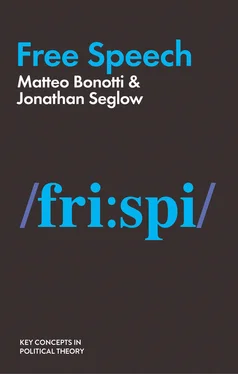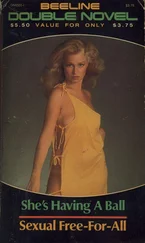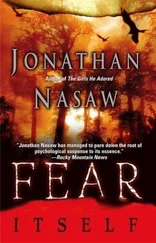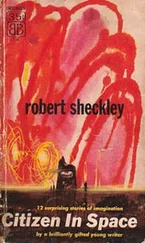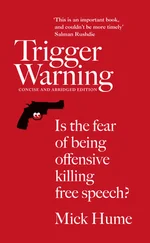1 Cover
2 Series Title
3 Title Page Free Speech Matteo Bonotti Jonathan Seglow polity
4 Copyright Page
5 Introduction Notes
6 1 Theories of Free Speech Introduction Free speech and truth Free speech and autonomy Free speech and democracy Interconnections between the three theories Note
7 2 Hate Speech Introduction Understanding hate speech Hate speech and truth Hate speech and autonomy Hate speech and democracy Further arguments for hate speech regulation Alternatives to hate speech regulation Notes
8 3 Holocaust Denial Introduction Holocaust denial: Hate, harm and context Holocaust denial and truth Holocaust denial and autonomy Holocaust denial and democracy Notes
9 4 Offensive Speech Introduction From blasphemy to offence Offensive speech and truth Offensive speech and autonomy Offensive speech and democracy Offensive nuisances, profound offences and Joel Feinberg’s ‘offence principle’ Notes
10 5 Pornography Introduction Conservative and communitarian arguments Pornography and truth Pornography and harm Pornography and autonomy Pornography and democracy Notes
11 6 Contemporary Challenges Introduction No-platforming and free speech Fake news and free speech Online public shaming and free speech Notes
12 Conclusion Notes
13 Bibliography
14 Index
15 End User License Agreement
1 Cover
2 Table of Contents
3 Begin Reading
1 ii
2 iii
3 iv
4 1
5 2
6 3
7 4
8 5
9 6
10 7
11 8
12 9
13 10
14 11
15 12
16 13
17 14
18 15
19 16
20 17
21 18
22 19
23 20
24 21
25 22
26 23
27 24
28 25
29 26
30 27
31 28
32 29
33 30
34 31
35 32
36 33
37 34
38 35
39 36
40 37
41 38
42 39
43 40
44 41
45 42
46 43
47 44
48 45
49 46
50 47
51 48
52 49
53 50
54 51
55 52
56 53
57 54
58 55
59 56
60 57
61 58
62 59
63 60
64 61
65 62
66 63
67 64
68 65
69 66
70 67
71 68
72 69
73 70
74 71
75 72
76 73
77 74
78 75
79 76
80 77
81 78
82 79
83 80
84 81
85 82
86 83
87 84
88 85
89 86
90 87
91 88
92 89
93 90
94 91
95 92
96 93
97 94
98 95
99 96
100 97
101 98
102 99
103 100
104 101
105 102
106 103
107 104
108 105
109 106
110 107
111 108
112 109
113 110
114 111
115 112
116 113
117 114
118 115
119 116
120 117
121 118
122 119
123 120
124 121
125 122
126 123
127 124
128 125
129 126
130 127
131 128
132 129
133 130
134 131
135 132
136 133
137 134
138 135
139 136
140 137
141 138
142 139
143 140
144 141
145 147
146 148
147 149
148 150
149 151
150 152
151 153
152 154
153 155
154 156
155 157
156 158
157 159
158 160
159 161
160 162
161 163
162 164
163 165
164 166
165 167
166 168
167 169
Matteo Bonotti
Jonathan Seglow
polity
Copyright © Matteo Bonotti and Jonathan Seglow 2021
The right of Matteo Bonotti and Jonathan Seglow to be identified as Author of this Work has been asserted in accordance with the UK Copyright, Designs and Patents Act 1988.
First published in 2021 by Polity Press
Polity Press
65 Bridge Street
Cambridge CB2 1UR, UK
Polity Press
101 Station Landing
Suite 300
Medford, MA 02155, USA
All rights reserved. Except for the quotation of short passages for the purpose of criticism and review, no part of this publication may be reproduced, stored in a retrieval system or transmitted, in any form or by any means, electronic, mechanical, photocopying, recording or otherwise, without the prior permission of the publisher.
ISBN-13: 978-1-5095-2644-4
ISBN-13: 978-1-5095-2645-1 (pb)
A catalogue record for this book is available from the British Library.
Library of Congress Cataloging-in-Publication Data
Names: Bonotti, Matteo, author. | Seglow, Jonathan, 1968- author.
Title: Free speech / Matteo Bonotti, Jonathan Seglow.
Description: Cambridge, UK ; Medford, MA : Polity, 2021. | Series: Key concepts in political theory | Includes bibliographical references and index. | Summary: “A compact guide to the major debates about what restrictions, if any, should be placed on free expression”-- Provided by publisher.
Identifiers: LCCN 2020048713 (print) | LCCN 2020048714 (ebook) | ISBN 9781509526444 (hardback) | ISBN 9781509526451 (paperback) | ISBN 9781509526482 (epub)
Subjects: LCSH: Freedom of speech--United States.
Classification: LCC JC591 .B683 2021 (print) | LCC JC591 (ebook) | DDC 323.44/30973--dc23
LC record available at https://lccn.loc.gov/2020048713
LC ebook record available at https://lccn.loc.gov/2020048714
by Fakenham Prepress Solutions, Fakenham, Norfolk NR21 8NL
The publisher has used its best endeavours to ensure that the URLs for external websites referred to in this book are correct and active at the time of going to press. However, the publisher has no responsibility for the websites and can make no guarantee that a site will remain live or that the content is or will remain appropriate.
Every effort has been made to trace all copyright holders, but if any have been overlooked the publisher will be pleased to include any necessary credits in any subsequent reprint or edition.
For further information on Polity, visit our website: politybooks.com
The 2016 Brexit referendum in the United Kingdom, Donald Trump’s election as president of the United States and re-election campaign in 2020, the rise of right-wing populism in Europe and further afield, the current wave of Islamophobia and anti-Semitism, and the hate speech targeting people of Chinese origin during the COVID-19 pandemic have brought freedom of speech to the forefront of public and academic debate, together with the question of whether hateful expression ought to be regulated. The tension between freedom of speech and offensiveness also continues to elicit controversy, as shown for example by the 2006 Jyllands-Posten Muhammad cartoons controversy and, more recently, by the attacks on Charlie Hebdo ’s offices in Paris in 2015 and 2020. The growing availability of Internet pornography has reignited long-standing debates between liberal and feminist thinkers concerning the permissibility of censorship and the tension between individual freedom and harm to women. Last but not least, recent phenomena such as fake news, trans wars and race culture wars have spurred new controversies regarding whether, when and how online speech should be regulated.
For example, in June 2020 Joanne K. Rowling, the author of Harry Potter , posted the following tweet in response to a headline about ‘people who menstruate’: ‘“People who menstruate”. I’m sure there used to be a word for those people. Someone help me out. Wumben? Wimpund? Woomud?’. 1Soon Rowling became the target of countless tweets accusing her of transphobia. 2In another example, in September 2020 US President Donald Trump attacked the Black Lives Matter movement and stated that ‘[l]eft-wing mobs have torn down statues of our founders, desecrated our memorials and carried out a campaign of violence and anarchy … Whether it is the mob on the street, or the cancel culture in the boardroom, the goal is the same: to silence dissent, to scare you out of speaking the truth and to bully Americans into abandoning their values.’ 3The contentiousness of the debates that followed these and similar incidents renders the theoretical analysis of freedom of speech, and of its permissible limits, both necessary and urgent.
Читать дальше
